
Egypt
22-sep-03
We fly from Amman airport to Cairo. The route is shown on an overhead video display, and we see that the plane must fly straight south to get past the southern corner of Israel, and then fly east-northeast to get to Cairo. The video also occasionally shows the airplane's orientation towards Mecca.
Approaching Cairo we see mile after mile of blocks of concrete apartment buildings, all 10 to 15 stories in height, without a tree or even a blade of grass visible. Cairo has an official population of about 19 million, but many estimates run much higher.
After landing we are met by a guide and a security officer, who accompanies us to our hotel.
Our hotel is the Gezirah Sheraton, a late-sixties style tower on the southern tip of Gezirah Island. There is a metal detector at the entrance, and security guards outside use mirrors on poles to inspect the undersides of approaching vehicles. (Security will be an inescapable presence throughout our stay in Egypt.) Our room has a magnificent view, and is very comfortable although rather shabby. From the bar on the 23rd floor of the hotel, we can see the pyramids at Giza.
In the late afternoon we drive through terrible traffic to our next meeting. In the Midan Tahrir traffic circle, one man washes his car while waiting for traffic to move.
22-sep-03, 6:00 pm
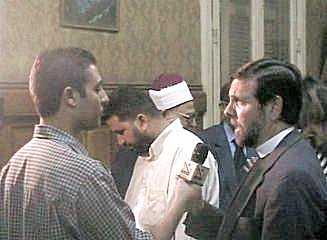 We arrive for a "round table discussion" at the Young
Muslim Association in Cairo.
A hugh banner over the door announces
"Religious Dialogue" in Arabic.
We are ushered into a small room full of people, where we go
through a reception line and are served tea and coffee.
A local television station interviews Rev. Tunkle and Bashar.
Barbara and I talk with Sofia, an Arab Protestant woman who
works for the YMCA and recently spent three months in Vancouver.
We also talk with an executive of the YMCA who is Muslim.
We arrive for a "round table discussion" at the Young
Muslim Association in Cairo.
A hugh banner over the door announces
"Religious Dialogue" in Arabic.
We are ushered into a small room full of people, where we go
through a reception line and are served tea and coffee.
A local television station interviews Rev. Tunkle and Bashar.
Barbara and I talk with Sofia, an Arab Protestant woman who
works for the YMCA and recently spent three months in Vancouver.
We also talk with an executive of the YMCA who is Muslim.
We think that the discussion will be held here, but after about 45 minutes of this, we are ushered to another room. To our shock, we are now in a large lecture hall already filled with 200 to 300 people. There is a long dais on a raised stage, with microphones. Several of our group are ushered up to the stage, while the rest of us sit in the front rows.
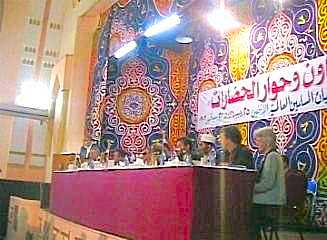 A Koranic invocation is chanted in Arabic. This is followed by
several impassioned speeches in Arabic, which Sofia tries to
translate:
A Koranic invocation is chanted in Arabic. This is followed by
several impassioned speeches in Arabic, which Sofia tries to
translate:
- The first speech is given by the executive director of the Young Muslim Association, and is mostly pleasantries.
- The second speech is is given by the president of Al Azhar University, and it seens to be the standard "Islam doesn't suck" talk, given in Arabic. (A translator does an excellent job of recounting an entire talk, from a few notes, rather than translating line-by-line.)
- A third speech is given by the creator of the Religious Dialogue program and the sponsor of tonight's event. He discusses media and religion, decries stereotyping, and encourages self-criticism in the Arab world.
- After this, Bashar is introduced and he explains the purpose of the Building Bridges program.
- The Palestinian Ambassador speaks in Arabic; he gets pretty worked-up venting his frustration with American policies. I sense that he his working his constuency.
- Sam Keen then gives a talk; he says that one of the good things about being an American is that he can disagree with his government and not risk jail. This comment seems to arouse sullen disbelief.
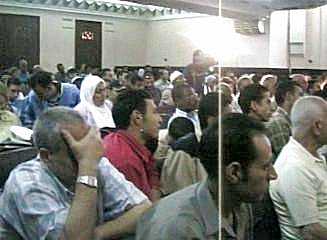 Finally questions are sent up from the audience, written on slips of
paper. Also, other members of our group are called on to give short
talks, usually centered around a question.
Finally questions are sent up from the audience, written on slips of
paper. Also, other members of our group are called on to give short
talks, usually centered around a question.
- There seems to be unanimous opposition to the eviction of Arafat. They don't like him, but they resent any outside attept to depose him.
- Paul Tunkle calls for including Jews in the Religious Dialogue. (This causes some muttering in the audience.)
- David Parks-Ramage gives a nice little speech, but the microphones have died by now, so it's all shouting.
- Katharine Kunst offered a challenge to the audience, asking "where are the women in the New Egypt?" There is some applause, but there is no applause for the Arabic translation. Sofia comes to the podium and gives an impassioned avowal that Egyptian women are free. She is followed by a Muslim woman who says much the same.
- After several other speeches, Barbara and I are ushered to the stage and, in turn, give short talks. I notice that there are Arabic translations of our biographies on the table; Bashar later tells us that they are very good translations, too.
- One guy gets up and says that dialogue is bad and just enables big countries like America to bully smaller ones. The translator likens him to "a cowboy from Upper Egypt". (However, later the "cowboy" talks to me and we exchange email addresses.)
- The meeting is breaking up and the trnaslator has already left the room, but a man from the audience gets up and starts ranting in Arabic. I can hear that he refers to Lyndon Larouche and David Duke, and Bashar says that he is claiming that 9/11 is a Jewish plot. He is hooted off the stage.
This exhausting experience finally ends at 10:00 pm. We have been here since 6:00, with no lunch, one power bar in mid-afternoon, and no dinner. We are exhausted, and we go find perhaps the only awful restaurant on the whole trip.
23-sep-03, morning
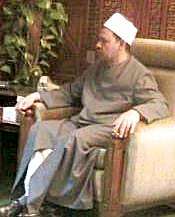 We ride to a large complex of lavish new buildings, looking much like
a school.
We are ushered to an office where we meet
Dr. Ahmad Al Tayeb, Grand Mufti of Egypt.
Dr. Al Tayeb was a professor at Al Azhar University for 1 1/2 years before
being appointed Mufti. He is considered to be a moderate; he
refused to support the Iranian fatwa against Salman Rushdie.
We ride to a large complex of lavish new buildings, looking much like
a school.
We are ushered to an office where we meet
Dr. Ahmad Al Tayeb, Grand Mufti of Egypt.
Dr. Al Tayeb was a professor at Al Azhar University for 1 1/2 years before
being appointed Mufti. He is considered to be a moderate; he
refused to support the Iranian fatwa against Salman Rushdie.
The Mufti continues with some observations on the relationship of Islam to other religions:
- Many of the Prophet's followers, including his daughter, went to a Christian country, Abyssinia, because they felt safe there during a time of inter-Muslim conflict.
- He cites the Koran books "The Romans" and "The Fatima", which we've heard from before. They have much on the equivalence of the Abrahamic faiths.
- He says "Islam is taken from Greek Philosophy" and "Sufism is from India." (He did not elaborate on this fascinating assertion.)
- In Islam, a man can marry a Christian or Jewish woman but cannot demand that she convert. Further, he is obliged to support her worship. A Muslim woman cannot marry a Christian or Jew because these faiths have no similar protections.
- In Spain, Christians, Jews, and Muslims lived in harmony. When Christians reconquered Spain, Muslims were forced to convert or leave. (We heard much about the benevolence and harmony of Andalusia.)
David asks about the possibility of non-violent resistance in Palestine. Is there such a tradition in Islam? The Mufti becomes animated and asks: who are you, that you preach to us about violence, with your Crusades and your Inquisitions? (It is clear to us by now that he treats Christianity as a single entity.)
At this point Sam, who has been the most confrontational person in the group, turns to us and says softly that we've gone as far as we can go here. He is right, so after some pleasantries we leave.
This is one of the best interviews we've had, because of the Mufti's frankness and the broad reach of the topics that he addressed. Many of our meetings have been ceremonial or blandly conciliatory, but the Mufti has been absolutely straightforward in expressing strong views. It is also a sobering interview because the Mufti has a wide reputation for moderation, yet we see his views as very hard-line.
We have also been seeing how our sense of history differs from the Arab views that we've encountered. To us, the Crusades are ancient history with no perceived relevance to our lives. In the Arab world, the Crusades are a very recent event with continuing consequences.
23-sep-03, morning
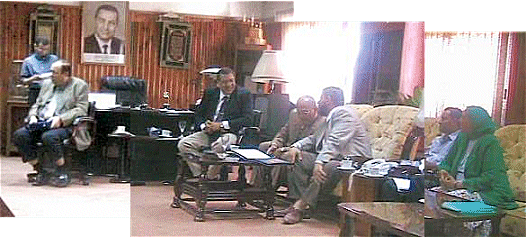 Today we visit Al Azhar University.
It is the oldest University in the world, founded in 970 AD.
We are ushered to the office of the University President
for an interesting and sometimes depressing discussion.
Today we visit Al Azhar University.
It is the oldest University in the world, founded in 970 AD.
We are ushered to the office of the University President
for an interesting and sometimes depressing discussion.
We are greeted by the President, Ahmed Omar Hashem, who cannot stay for the discussion. The Vice-President talks about the University in an impenetrable accent. (Bashar later tells us that his Arabic is just as hard to understand; he apparently has a severe speech impediment.) Also with us are a number of faculty members and doctoral students who are English-speakers with a particular interest in cross-cultural issues. One of the men has read Sam's book, "Faces of the Enemy".
The Palestinian issue quickly comes up. The western press is denounced for using the term "suicide bombers" instead of "martyrs". One woman says that she feels that the western press values the lives of children more highly if they are Israeli. When discussing the possibility of a truce, someone says that the last truce was violated by Israel after only three days, when they assassinated a Hamas leader. Therefore, they argue, no truce is possible because Israel cannot be trusted.
There is much emphasis on the need for America to be perceived as a fair broker in the peace process. They express much admiration of Jimmy Carter, respect for Bill Clinton, and strong dislike for George W. Bush. The Prince Abdullah initiative (which acknowledges Israel's continued existence) is widely accepted here.
I ask my leading question: The Arab nations are so focused on the Palestinian issue that they aren't addressing their own internal problems. Some leaders even seem to be using the Palestinian issue to divert attention from their own shortcomings. What would be the prime problems, the "next steps", in the Arab world if the Palestinian issue were "magically" resolved? The answer surprises me: they tell us that they cannot answer, that only their leaders could decide such issues.
We say our goodbyes and leave. This was an interesting meeting except when the Vice-President spoke. He was hard to understand and generally gave only empty platitudes. Whenever he spoke, the oxygen seemed to be sucked right out of the room. I sensed impatience on the Egyptian side, as well. This meeting also showed some depressingly extreme opinions, especially given that this is a group of academics focused on inter-cultural dialogue.
Another observation: I've noticed a theme in our Egyptian meetings: the Egyptians that we've met tend to respond to questions by asking other questions.
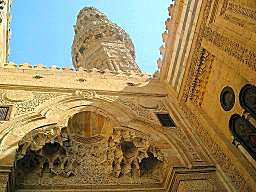 We then go to the old market, and some of us also visit Al Azhar mosque.
We then go to the old market, and some of us also visit Al Azhar mosque.
24-sep-03
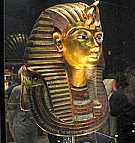 We visit the National Museum. This is an amazing place, with
priceless treasures housed in dusty cases with yellowing typed labels.
The King Tut exhibit alone is staggering.
We visit the National Museum. This is an amazing place, with
priceless treasures housed in dusty cases with yellowing typed labels.
The King Tut exhibit alone is staggering.
24-sep-03, 11:15 am
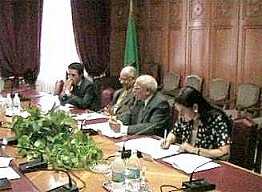 We meet Samia Bibars, Second Secretary of the Inter-Civilizations Dialogue
Department of the League of Arab States. We already met her last night;
She is very well-educated, personable, and Western in
appearance and dress. She will be very helpful to us throughout
the trip, and we take a great liking to her.
We meet Samia Bibars, Second Secretary of the Inter-Civilizations Dialogue
Department of the League of Arab States. We already met her last night;
She is very well-educated, personable, and Western in
appearance and dress. She will be very helpful to us throughout
the trip, and we take a great liking to her.
At 11:15 we arrive at the General Secretariat of the League of Arab States, a lovely building near the National Museum. We meet Dr. Ahmad Kamel Magd, who has a PhD on the topic of "American Judicial Review". He lived for 7 years in the U.S.A, and has done much work with interfaith communication. He is the Arab League Commissioner for Inter-Civilizations Dialogue. Also with us are several other members of his group, and Ms. Bibars.
Dr. Magd says that he'll start with 7 minutes of remarks and then we'll open up the discussion. This sounds great; by now we're accustomed to long speeches instead of dialogue. However, he instead spends 35 minutes talking, then his second-in-command, Mr. Yassin, talks awhile, and then the meeting ends.
He says some interesting things, but also rambles. From my notes:
With modern communications and media, brainwashing becomes much easier. A small group can get anyone elected. (While he doesn't say it, the implication is that the last U.S. election was, essentially, bought.)
The prerequisites for dialogue are:
1) There are other people and other opinions; diversity is good
2) Don't try to convert the other; accept disagreement.
A current danger is the collapse of "preservative institutions" like family and neighborhoods, the growth of violence, and the growing scarcity of resources. Water, he says, will be a dominant issue in the 21st century.
He is careful to talk about the U.S. rather than "the West". The U.S. is different; for one thing, America never colonized the Arab world. Also, the Arab nations joined the U.S. in opposing the U.S.S.R.
Arabs feel marginalized and ill-treated. Dr. Magd recounted a conversation with a Very High-ranking American official (that he wouldn't name), who bluntly accused him: "you guys are killing our friends in Israel". This deeply offended him, given that Egypt has been at peace with Israel for decades and has given much support to the U.S.
When asked about a fair resolution of the Palestinian crisis, he cited an article by Abraham Borg, President of the Knesset, in which he argued that for peace, everyone must sacrifice an aspiration. When pressed for details on viable endpoints, Dr. Magd refused to discuss them, saying that we need to focus instead on the process. [A mistake, in my opinion.]
Clinton's efforts at arbitration were seen as sincere and fair. The arrivals of Sharon and Bush have caused great damage. The future of Jews in the new century, he says, depends on Jews in Israel and the U.S. He further emphasizes the need for the U.S. to be a fair mediator.
Dr. Magd tells many rambling anecdotes, waxing nostalgic about the time when Muslims, Christians, and Jews lived together amicably. [The last Jews fled Cairo in the late '60s, when Nasser aroused anti-Jewish sentiment as a way of deflecting attention from his own failed policies. There is now only one Synagogue in Cairo, with an elderly caretaker and no regular services.]
Dr. Magd agrees that the Arab world has communicated poorly, giving too much voice to extremists. He does say that "Americans are the best listeners in the world" and that the Arabs have failed to speak up.
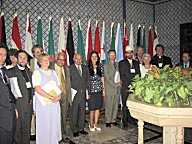
Mr. Yassin talks about how Arabs could portray themselves. Arabs need to learn self-criticism and objectivity. He also says that America has a very positive image in the Arab world.
He decries the current American bias towards Israel, in particular that the U.S. is often the only country to veto U.N. resolutions condemning Israel's stated intention to exile or kill Arafat. He says that International Law explicitly allows citizens of an occupied country (ie: Palestine) to resist the occupation. He particularly cites the demolishing of houses. (The extrajudicial demolition seems to particularly outrage the Arabs that we have met.) [Mr. Yassin is lecturing us, though, rather than engaging in dialogue.]
In closing, Dr. Magd gives some advice to Bashar: be American, be a witness for moderate Islam, and don't ask for advice from the Arab world.
24-sep-03, 1:45 pm
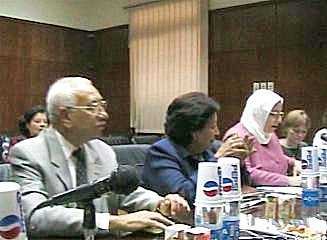 We arrive at Cairo University at 1:45 PM.
At one of the many buildings
we go to a small lecture hall that has a long table at one
end and 7 or 8 rows of small writing desks facing it.
There are 6 or 7 Egyptian men and women sitting at the table with us,
and several other people sit in the nearby desks.
We exchange the usual introductions and pleasantries.
We arrive at Cairo University at 1:45 PM.
At one of the many buildings
we go to a small lecture hall that has a long table at one
end and 7 or 8 rows of small writing desks facing it.
There are 6 or 7 Egyptian men and women sitting at the table with us,
and several other people sit in the nearby desks.
We exchange the usual introductions and pleasantries.
Sam starts to give his talk about "Faces of the Enemy", but the moderator interrupts. One woman gets up and denounces this as a lecture rather than dialogue. (And she does have a valid point.) She also gives a short rant about America, ending by saying she won't go to New York "because of the hate there." She then stomps out.
The senior academic goes into a conciliatory talk. (I missed his name, unfortunately.) He is quite articulate, and he goes straight to the Palestine issue and covers the usual ground.
He then introduces a woman who has been quietly sitting in one of the nearby desks, calling her "Doctor Heba". She is dressed simply and is wearing a hejab. (No, she is not the woman in the picture above; I unfortunately have no photographs of "Doctor Heba".) She joins us at the table and opens a tiny spiral notebook, saying that she had been jotting down a few thoughts on inter-civilization dialogue:
In order to have identity, there must be boundaries. "How can we build a sense of identity in a time of hybridity without dehumanizing the enemy?" The importance of Image means that the role of language is declining, and the return of language is critical to communication.
We are now at a moment of "translocality, translation, transnationalization, and transcendance." (She goes on to elaborate on these "four trans", I can't possibly do this justice here. By this point we are completely absorbed in her talk. Her use of English is absolutely mesmerizing.)
In this time of the "four trans", we need "five re's":
- Revision. As in re-vision, the creation of new images.
- Reform. An understanding of what is historical and what is innately human.
- Re-enchantment with the world.
- Reconciliation. To work out our grief.
- Repentance. (This, she said, is perhaps only for the faithful.)
At the end of her talk, we are so overwhelmed that we break into spontaneous applause. This woman is the most subtle and deep thinker that we've encountered, and the most articulate. My notes cannot convey any sense of her talk. [Her name is Dr. Heba Raouf, and later googling shows that she is a well-known and widely-published academician in the Middle East. She is also a contrarian thinker, refusing to be branded as a "feminist". She has several children, and later that evening I'll meet her husband.]
Several other people speak, with few surprises. Sam points out that we're engaged in meta-dialogue, that we still don't know anything about each other. We need to sit down and show each other photographs of our grandchildren.
The "senior guy" says that Egypt has a tradition of moderation that puts them in a good position for improving America's image of Islam. Egyptians don't like Wahhabism, or "petro-Islam".
24-sep-03, evening
 Around 6:30 PM we take a long ride to the Maadi district, a
wealthy enclave.
The neighborhood has many security checkpoints with armed guards.
We reach the home of
Elizabeth Thornhill, Cultural Attache of the American Embassy.
It's a charming house built in 1935.
She is giving a party in our honor.
Around 6:30 PM we take a long ride to the Maadi district, a
wealthy enclave.
The neighborhood has many security checkpoints with armed guards.
We reach the home of
Elizabeth Thornhill, Cultural Attache of the American Embassy.
It's a charming house built in 1935.
She is giving a party in our honor.
The party is a buffet on her back lawn, with no alcohol served. (We are "dry" for the whole trip.) We meet and chat with a number of Egyptian intellectuals, some of whom we've met before. The food is excellent, with mostly local dishes and Egyptian "street food".
I meet the founder of Islam Online, a psychotherapist whose wife is Dr. Heba Raouf, who so impressed us this afternoon at Cairo University. I discover that psychotherapy, as taught in Egypt, is behaviorism and medication. "Talk" therapy is not taught and is not available here. He is quite surprized when I mention that many American therapists practice and recommend meditation; the connection is not obvious to him.
Barbara talks with Dr. Magd of the League of Arab States. He is married to a Roman Catholic woman, and previously was married to a Protestant. He is a charming man in this social setting.
Bashar gives a short talk to the party, explaining our mission. He is clearly exhausted, and I seriously fear that he'll fall over.
Barbara talks to an American woman who is married to a Palestinian and lives on the West Bank. She has been to more than 100 funerals. Everyone knows someone who has been killed. An elderly man, shot dead by Israeli soldiers when he looked over the edge of his roof at a disturbance below, was her husband's uncle.
25-sep-03
The next day we spend in Alexandria, particularly visiting the newly completed library. Our meeting with the Head Librarian is cancelled, but we are relieved rather than disappointed.
26-sep-03
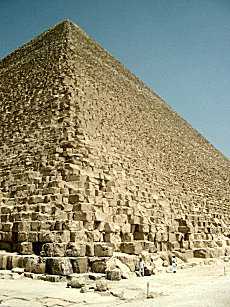
 On our last day in Egypt
we visit the pyramids at Saqqara, and then the pyramids at Giza.
On our last day in Egypt
we visit the pyramids at Saqqara, and then the pyramids at Giza.
We then visit the old market again. Far into it, away from the tourist area, we find an old man with very bad teeth selling peanuts from a small cart. When we tell him that we're American, he beams. He loves America, he loves Jimmy Carter, says that I am a very lucky man, that California is very warm. He presses candy and peanut samples on us. His warmth seems genuine and we are grateful.
We also visit the Pyramids and the Sphinx. The Sphinx looks towards a parking lot and a row of shops. In front of the Sphinx, workmen are setting up for an upcoming motorcycle race.